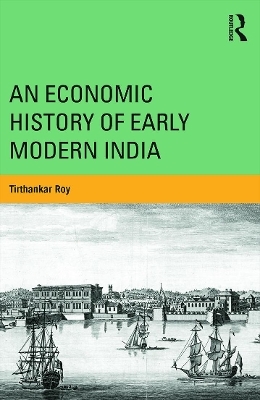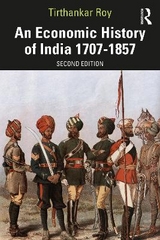
An Economic History of Early Modern India
Seiten
2013
Routledge (Verlag)
978-0-415-69064-5 (ISBN)
Routledge (Verlag)
978-0-415-69064-5 (ISBN)
- Titel erscheint in neuer Auflage
- Artikel merken
Zu diesem Artikel existiert eine Nachauflage
The death of the Mughal emperor Aurangzeb in 1707 until the annexation of Maratha territories by the British East India Company in 1818 was a period of transition for the economy of India. This book focuses on these transitions, and shows how a study of this period of Indian history contributes to a deeper understanding of the long-run patterns of economic change in India.
Momentous changes occurred in business and politics in India during the eighteenth century - the expansion of trade with Europe and the collapse of the Mughal Empire, resulting in the formation of a number of independent states. This book analyses how these two forces were interrelated, and how they went on to change livelihoods and material wellbeing in the region. Using detailed studies of markets, institutions, rural and urban livelihoods, and the standard of living, it develops a new perspective on the history of eighteenth century India, one that places business at the centre, rather than the transition to colonial rule.
This book is the first systematic account of the economic history of early modern India, and an essential reference for students and scholars of Economics and South Asian History.
Momentous changes occurred in business and politics in India during the eighteenth century - the expansion of trade with Europe and the collapse of the Mughal Empire, resulting in the formation of a number of independent states. This book analyses how these two forces were interrelated, and how they went on to change livelihoods and material wellbeing in the region. Using detailed studies of markets, institutions, rural and urban livelihoods, and the standard of living, it develops a new perspective on the history of eighteenth century India, one that places business at the centre, rather than the transition to colonial rule.
This book is the first systematic account of the economic history of early modern India, and an essential reference for students and scholars of Economics and South Asian History.
Tirthankar Roy is Professor of Economic History at the London School of Economics and Political Science, UK. His previous publications include India in the World Economy from Antiquity to the Present (2012), The Economic History of India 1857-1947 (3d edition, 2011), and Rethinking Economic Change in India: Labour and Livelihood (Routledge, 2005).
1. Introduction: The ‘Early Modern’ in Indian Economic History 2. Formation of New States 3. Consequences of State Formation: Colonialism, Public Goods, and Institutions 4. The Agrarian Order 5. Conditions of Business 6. Towns 7. Levels of Living 8. Conclusion
| Erscheint lt. Verlag | 25.6.2013 |
|---|---|
| Zusatzinfo | 4 Line drawings, black and white; 7 Halftones, black and white; 3 Tables, black and white; 11 Illustrations, black and white |
| Verlagsort | London |
| Sprache | englisch |
| Maße | 156 x 234 mm |
| Gewicht | 295 g |
| Themenwelt | Geschichte ► Allgemeine Geschichte ► Neuzeit (bis 1918) |
| Geisteswissenschaften ► Geschichte ► Regional- / Ländergeschichte | |
| Geschichte ► Teilgebiete der Geschichte ► Wirtschaftsgeschichte | |
| Sozialwissenschaften ► Soziologie ► Spezielle Soziologien | |
| ISBN-10 | 0-415-69064-1 / 0415690641 |
| ISBN-13 | 978-0-415-69064-5 / 9780415690645 |
| Zustand | Neuware |
| Informationen gemäß Produktsicherheitsverordnung (GPSR) | |
| Haben Sie eine Frage zum Produkt? |
Mehr entdecken
aus dem Bereich
aus dem Bereich
Giordano Bruno - ein ketzerisches Leben
Buch | Hardcover (2024)
C.H.Beck (Verlag)
29,90 €
das dramatische 16. Jahrhundert
Buch | Hardcover (2024)
Rowohlt Berlin (Verlag)
34,00 €



